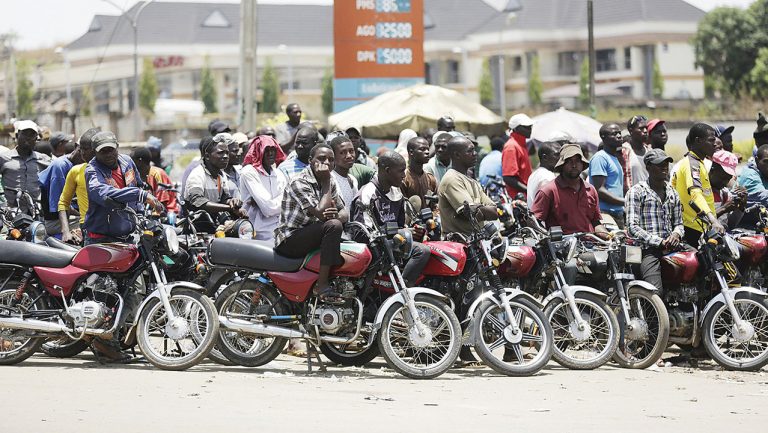News
OPINION: Time Ticks For Nigerian Ruling Elite
Published
5 months agoon
By
Editor
By Suyi Ayodele
I take a bet. The judgement of God and of the people is nigh! Check your neighbourhood. For weeks, and in some cases, months, there is no electricity. But in your houses, you run your generator. Neighbours come around to charge their phones, rechargeable lamps and what have you in your compound. How do you tell them that you are not part of the oppressors? What about water? As early as 5 am, neighbours are already on the queue in front of your house to fetch water. They don’t have the boldness to knock on your gate to wake you up. They know that they are at your mercy, and so, they wait until you wake up to turn on the tap for them. Many of these people grew up with functional water corporations and dams in their towns and villages. We are already in the festive period. How many Nigerians have what to eat during this season? How many can afford a bag of rice? How many will be able to buy clothes for their children and wards? How many are already calculating the school fees for the second term which begins by the first week of January 2024? When you consider these, you will realise that there is no time to postpone fixing Nigeria. The elite just have to fix Nigeria now or Nigerians will fix them, and permanently too. The masses are like the sheep. Those are the most gentle of all animals. But they have the most poisonous teeth ever! You can read me again. Sheep have teeth. Just pray they don’t bite you with them. There is no anti-rabies vaccine that can cure that.
Dr Kashim Shettima, the vice president, is a brilliant man. As a politician, he may not be a good man. No Nigerian politician of this inglorious era is good. I make no bones about that. I saw Dr Shettima a couple of times on television during the 2023 campaigns. I enjoyed his dramas when he served as the Director General of the Tinubu Campaign Organisation during the All Progressive Congress (APC), presidential primaries. He was blunt and assertive. He appeared then to know what he wanted, or what he was briefed to do. In the delivery of his mandate then, he did not spare anyone. He took no prisoners. He insulted as many as he could. He befriended those he considered useful to the project at hand. He was acerbic in his dealing with the then Vice President, Professor Yemi Osinbajo, a Senior Advocate of Nigeria (SAN). Fortune smiled on Shettima at the end of the primaries. His principal, Tinubu, picked him as his running mate. The duo went ahead to win the general election. Today, Shettima occupies the office he once said was only good for selling ice cream and popcorn! Unfortunately, since May 29, 2023, Dr Shettima and the government he serves as the vice president have been serving Nigerians more than ice cream and popcorn. The government of his principal serves Nigerians pains and agony. He is aware of this and the inherent danger. He spoke about it not too long ago.
In his recent outing in Abuja last Saturday, Shettima sounded more of a populist than a realist. He spoke at the graduation ceremony of the Executive Intelligence Management Course 16 participants from different security agencies and nominees of state governments. His submission was that with the present high cost of living, Nigerians “are angry with government officials.” If he expected us to clap for him for saying that, I can tell him for free that he is damned wrong! Absolutely WRONG! The vice-president talked about the parlous condition of the common man in Nigeria of today. He said that the ruling elite had between 10 to 20 years to do something, otherwise, something will give. Here are his exact words:” … But now, as we cruise around in our bulletproof cars, one will see contempt in the eyes of the poor. We have to improve the quality of governance. And what we have is a tiny window of not more than 10 to 20 years. Let’s improve the quality of governance.” He is, again, wrong! With the situation of things in Nigeria, the bomb can go off any moment. Call me an alarmist; the time ticks precariously. Shettima and his gang don’t have five years, not even two years. The time to make corrections and bring back life to the people is now.
FROM THE AUTHOR: OPINION: Gbelebu As Agbelebu Of Misgovernance
The locusts that had before now eaten up of our vegetation had been buying time. The current generation of vampires in power thinks it can buy more time. There is no more time. Things are bad. No! Things are at their worst ebb. The middle class is eliminated, completely. What we have now are two contrasting stratifications of the super-rich, and super- poor. Poverty is shared in equal proportions. Those who have no reasons to beg are now corporate beggars. We are all engaged in ‘fine bara’. I am not exempted. The other time, my laptop collapsed beyond repair. I couldn’t raise the money for a new one. Who did I turn to? My 65-years plus first cousin! I struggled to call him. I felt ashamed calling a 65-year-old man to come to my rescue, when he is supposed to be resting. But I thank God he did what I asked for without hesitation. He must have known that I was at the end of my tether to have called him in far way UK for a laptop. Truth be told; I was at my breaking point before I made that call. I ask this: how many people have cousins or relations who would respond promptly to that type of Macedonia call? How many of such requests can I respond to if occasions demand? This is not because one is wicked or selfish. The means are not just there. Many relationships have broken because of this. We ignore calls we would hitherto have picked with enthusiasm. This is our situation, Dr Shettima. This is the level crass misgovernance has pushed us to. I don’t see the projected 10 to 20 years of redemption as realistic. The time to do it is now!
Why am I so worried about the present situation? Something happened to me last weekend. I was in Ekiti State last weekend. From Ado Ekiti to Odo Oro through Ijesa Usu Ekiti, I saw poverty in its naked form. Driving around the neighbouring Ikole Ekiti axis, at a spot, a big female goat ran across the road, and I slammed the break. The resultant dust from the dusty road attracted curses from the people around. “Rírá lu à rá nú” (may you be lost forever), they pronounced. I recognised two of the people. I parked the car, turned off the engine, and alighted. One of them, who felt that I was coming to challenge them said something in our Ekiti dialect: “Hìn jé ha bò; erun rè à kan (let him come, his mouth will go sour). I approached them. They recognised me. The most elderly of them said: “Hùwo hà hin, Suyi (So it is you, Suyi). We exchanged greetings, and apologised for the dust.
The most aggressive one among them said something similar to what Dr Shettima alluded to. While apologising for the curse, he added: “Hà rò wípé òkàn núnú hìhan olórí burúkú hàn nì ni (We thought it is one of those bad heads). That is the level of aggression in the land. Hunger is already mixing with anger. My screeching of the brake attracted curses and aggression from people, who before now would have shown sympathy and thanked God on my behalf for not damaging the car. As I left them, I kept wondering what had happened. They knew the goat ran to the road. They knew I avoided killing it by applying the brakes Yet, they still cursed me. Now, ask what would have happened if I were not someone they are familiar with. Or, I was to be a top government official, the type the people had already labelled hìhan olórí burúkú (bad heads). If we continue like this, the bullet-proof cars will not be enough. I deliberately employed the plural pronoun, “we”, because whether we like it or not, we shall all be victims of the people’s reaction. It does not matter whether one had been in government before or not. As long as you drive a nice car, put on fine cloth, and you look ‘fresh’; you belong to the ruling elite in the estimation of the poor.
FROM THE AUTHOR: OPINION: Rivers Of Betrayals
Someone foresaw our situation long ago. He equally forewarned us of the looming danger hanging over us all. His name is Chief Jeremiah Oyeniyi Obafemi Awolowo. Before he joined the sages on May 9, 1987, he granted an interview on a wide range of issues. Professor Moses Akin Makinde captured some of the things the Avatar, Awolowo, said in that interview in a book: “AWO: The Last Conversation” (2009). The philosopher-politician talked about the attitude of the northern elite to the poverty over there and warned thus: “But I think that sooner than later, the leaders of the north will see the repercussions of their selfishness and carelessness in their attitude towards western education. But the time will be too late, and if they don’t regret it or blame themselves for lack of foresight, the northern youth may ask their leaders some questions when they see the rate of development that goes with education in many parts of southern Nigeria. They may then wonder whether it was in their stars or in the selfishness, carelessness and lack of foresight of their past and present leaders.” If the dead do see the living, Awolowo would have seen that it is not only the northern youths that are asking questions now. All Nigerians do. The questions are too dangerous. The question, ‘how did we get here’? is not asked with joy and happiness. The western education Awolowo donated to the south, particularly the Western Region in the early 50s is now a waste today. Or, what do you make of a child with two post-graduate degrees that has remained jobless for over five years? How useful is that education? What has happened to all the cottage industries established by the founding fathers of the nation? Who wasted them?
Awolowo, in that same interview, talked about the qualities of his ministers and advisers. He said he chose them “strictly on merit and because of their education, standard and discipline.” He added: “Every minister or adviser and top civil servant had to do his homework properly before bringing anything to a cabinet meeting or any other important meeting where it will be subjected to rigorous debate. Where there are grey areas, expert opinion would be sought for the purpose of objectivity…It is because of this service to the public that I often maintained that the office of the President, or Prime Minister is not for pleasure. Unfortunately, in Nigeria, it looks as if the office of the President, Minister or Adviser is for pleasure, like dining and wining and carousing with women of easy virtue both at home and abroad.” Sad! If I should trouble the sage in his rest, may I announce to him that in the Nigeria of today, ministers pay to be given ‘juicy’ portfolios; that members of the National Assembly now rise to sing solidarity songs whenever the president comes calling. May I inform the legend that in the Nigeria he left behind, some felons killed our darling Deborah Samuel on May 12, 2022, at her Shehu Shagari College of Education, Sokoto, and they got away with it. But Rhoda Jatau, who condemned the killing, was arrested on May 20, 2022, and spent 18 months in prison custody in Bauchi before she was finally released on bail! And she would still have her days in court for alleged blasphemy, incitement and cyber-stalking.
From Sokoto to Ibadan, Kafanchan to Eduabon; from Okigwe to Jalingo, and from Makurdi to Ode Irele, poverty walks on all fours. On the faces of the people are frustration, anguish and anger. Dr Shettima saw this in his Maiduguri. He once had the opportunity to change the narrative and improve on the lots of the people. He was a governor for eight years. Under his watch, over 280 school children were kidnapped in Chibok. His reaction was to reward the principal of the school with an appointment as a commissioner! Now, in the year 2023, the same man, as the number two citizen in Nigeria, is asking for a moratorium of 10 to 20 years to “improve the quality of governance”. No sir, Mr. Vice President. Do it now for the time ticks!
You may like


Bello And Enenche: A Tale Of Two Lions [OPINION]


OPINION: Why Were Miyetti Allah And Tinubu’s Iyaloja In Ibadan?


OPINION: Bobrisky’s Masque, Yahaya Bello’s Boa


OPINION: Onitiri-Abiola And The Madness In Ibadan


OPINION: For Yoruba Muslims And Pentecostals


OPINION: Bobrisky And Our Other S/He Offsprings

By Lasisi Olagunju
One day, I will have the courage to ask the immaculate Ooni of Ife, Oba Enitan Ogunwusi, how he feels each time he travels on the horrible Ibadan-Ife road. Ben Okri, ‘The Famished Road’ storyteller, finds his own ‘road’ a torment – he says it “leads home and then away from it, without end.” Okri thinks the road a torment because he meets it “with too many signs and no direction.” The Ife-Ibadan road has signs, it has directions – and I find them very treacherously significant because they interlock fingers while road users lose life and limbs. The road has signs and directions to the very bowel of hell.
Olojo, the guardian divinity of the House of Oduduwa, is the famed owner of two machetes: with one machete, he prepares the field for the plants of tomorrow; with the other, he clears the road for prosperity (Ó fì’kan sán’ko/ Ó fì kan yè’nà). Those weapons must either now be blunt or lost. An Odu Ifa tells us something about Ile Ife and roads. It affirms that well-paved open roads start from Ile Ife. That affirmation today can only be treated on the operating theatre of irony. Could it be that truth has an expiry date and Ogbe’s truth of good, open roads in Ile Ife has expired? What we see today from the capital of Yorubaland (Ibadan) to the historical source of Yoruba people is the torment of a closed road that mocks the pathfinder-spirit of Oduduwa. The road does worse with its gaping craters and their threats of morphing into greater gullies. And it is a federal road.
Has the Ooni ever told the president that the worst road in the universe leads to his kingdom? Has he told the president that the N79.8 billion contract for the reconstruction of Ibadan-Ife-Ilesa road awarded in September, 2019 by his friend and villa mate, Muhammadu Buhari, has remained a contract for ghosts? Has he invited the president’s attention to the truth that since last year when he took over, the road has sunk even deeper in the mire of decrepitude? And, that even FERMA, a perennially rich agency that pretends giving palliatives on federal roads, has since seen the futility of stitching this rag? Or could it be that Kabiyesi does what our presidents since 1999 do – escaping road users’ pains by flying over our heads?
FROM THE AUTHOR: OPINION: Bobrisky’s Masque, Yahaya Bello’s Boa
The reigning culture here is rooted in the ragged soils of our toil. I admit that badness is not peculiar to the Ife-Ibadan-Ilesa road. It is a national affliction that can’t be cured because of the greed of doctors who treat sick roads with fake and expired drugs.
We work hard to build roads that wear out before they are inaugurated. We have the interminable construction mess called Lagos-Ibadan Expressway. When did construction start there? When will it end – if it will ever end? How much have we sunk there? And, is it not a shame that the road is ready already for corrective surgery even before its makers are done making it? If you are a woman, and you are pregnant and your doctor tells you dancing is a ‘safe and fun way to exercise’, do not dance to the break beats of that road. It is made for abortion.
Ben Okri says “all roads lead to death” and “some roads lead to things which can never be finished.” Is that why our federal government’s roads are forever ongoing, none is ever finished or completed? Federal government’s statistics says out of Nigeria’s national road network of 200,000 kilometers, 36,289 km belong to it. Now, you ask Abuja which of its other roads, apart from the one from the Villa to Abuja airport, is good? Ask them why almost all roads that wear federal tags suffer neglect, abandonment or crass abuse.
My NYSC journey to the far north 34 years ago was on the Ibadan-Ilorin-Jebba-Mokwa-Yauri road. It was an experience in pleasantness. It is, today, a monument to frustration, a shrine to demons that feed on losses -human and material. The Ibadan-Oyo-Ogbomoso part of that road is one major reason why Nigeria should not have a federal government – or have roads managed by the Federal Government. There should be a coroner’s inquest on why that road was killed and who killed it. Without the states, the vehicle of Nigeria would have long lost its chassis. States keep doing what heart surgeons do when arteries are found blocked. They create bypasses, byways. A brand new 78-kilometre Iseyin-Ogbomosho road has just been built by Seyi Makinde’s Oyo State to escape the Federal Government’s death trap along that axis. A commenter online wrote: “The road has helped us to link northern Nigeria without using the dangerous Oyo-Ilorin road that has consumed so many lives…” The Oyo-Ilorin road of death spoken of here belongs to the government in Abuja.
FROM THE AUTHOR: OPINION: For Yoruba Muslims And Pentecostals
Potholes jolt us to appreciate what bad roads represent in our lives. They tell us why the tyres of our country never last and why our rides are forever bumpy. Asking questions on why our roads are perennially bad is living the times of Ayi Kwei Armah’s ‘Two Thousand Seasons’: “A thousand seasons wasted wandering amazed along alien roads, another thousand spent finding paths to the living way.” Like Ouroboros, the self-tail-devourer, Nigeria’s ‘alien roads’ cyclically keep consuming the ‘living way.’
It is time to pound yam for the household, the idler among us goes for the heaviest pestle. This is better said in Yoruba: Òle bàá tì, ó gb’ódó nlá. There are abandoned federal roads everywhere which directly affect millions of Nigerians, but the government has moved the money to a 700km super coastal highway that will cost N15.6 trillion. The first phase is 47 kilometres, starting somewhere and ending nowhere, at a cost of N1.06 trillion. Should I just say that that N1 trillion will start and complete the reconstruction of decrepit Ibadan-Ife-Ilesa Road (224km), Ilorin to Bida (244.9km) and Shagamu to Benin (492km) if wisdom wills? Even at an inflated cost of N1 billion per kilometre, our husbands will achieve these and will even ‘collect change’. And Tinubu would have become very popular with it. But he wants a white elephant and has moved our money to purchase it.
White elephants are always expensive! Poet and journalist, Mathew Wills, in his ‘The Original White Elephant’ defines ‘white elephant’ as “something excessive that turns out to be valueless.” James A. Robinson and Ragnar Torvik in 2005 published an interesting article about the third world and deliberate bad investments – they titled their article: ‘White Elephants’. In that piece, they hold that politicians around here would always go for “white elephants” as against “socially efficient projects” because “the political benefits are large compared to the surplus generated by efficient projects.” That piece says much more than this. It is published in the Journal of Public Economics 89 (2005: 197-210). I think you should read it.
‘The Stolen White Elephant’ by Mark Twain is an interesting story on the cost of investing in big, expensive loss centres. It is the story of a fictional Kingdom of Siam. A reviewer says Siam is blessed with a “national appetite for fraud”. Another says it has officers of “pompous assumption of infallibility and ridiculous inappropriate procedures.” The “pointless” story is about an expensive search for a stolen white elephant, a further loss of hundreds of thousands of dollars in compensation and the eventual discovery of the rotting corpse of the supposedly stolen animal. The story ends with the duped narrator celebrating the man who duped him. It ends as the man pronounces himself “a ruined man and a wanderer in the earth.” In Studies in American Humour, Peter Messent (1995) does a lot of justice to it in his ‘Keeping Both Eyes Open.’ The whole story sounds Nigerian; what Fela called “expensive shit.” But I can argue that though we wander today, the past was a better experience.
FROM THE AUTHOR: OPINION: FG’s N90 Billion Hajj Politics
“How can you develop a country rapidly if you can’t get about it?” Sir Rex Niven, pre-independence Speaker of Northern Nigeria House of Assembly, asked that question 69 years ago in relation to the state of roads in Nigeria. On January 27, 1955, Riven was asked to brief the Royal African Society and the Royal Empire Society in London on “Recent Developments in Nigeria.” He gave a very detailed account of himself as a British participant in the affairs of a key component of the Nigerian federation. Sector by sector, he spoke about efforts and failures. He particularly spoke on roads which he described as “the most important of the great aspects of development.” He said as he was speaking (in 1955), Nigeria had over 30,000 miles of roads whereas in 1920, “she had hardly any at all.” Then he used Kabba (in present Kogi State) to illustrate what he was saying: “The first province I went to, the newly constituted Kabba Province, had exactly 4 miles of road…but when I left Kabba four years later, there were over 200 miles of road.” Thirteen years later, the same Niven, in retirement, told the Commonwealth section of the Royal African Society on 11 November, 1969 that Nigeria had 40,000 miles of quality roads. That figure was even in spite of the ongoing civil war. Now, you ask: Why are our golden years always in the past? The past was obviously better handled.
News
Lagos, Ondo, Taraba Top In Highest Okada Fares In March – NBS
Published
18 hours agoon
April 28, 2024By
Editor
A recent National Bureau of Statistics report shows Lagos, Ondo, and Taraba recorded the highest Okada (motorcycle) fares in March.
The data indicates substantial differences in transportation costs across various Nigerian states.
In March 2024, the average fare for Okada rides per trip in Nigeria rose by 2.15% compared to the same period last year, with fares reaching N472.16, up from N462.21 in March 2023.
This was contained in the most recent National Bureau of Statistics Transport Fare Watch report for March 2024, published on the agency’s website.
READ ALSO: Ondo 2024: lT Expert Emerges As SDP Candidate
However, fares in Lagos, Ondo, and Taraba states were notably above the national average for March 2024.
Lagos had the highest Okada fare at N850 per trip, with Ondo following at N725 and Taraba at N670, illustrating significant differences in transportation costs across regions.
Imo and Yobe states, with average Okada fares of N655 and N630 respectively for March 2024, ranked fourth and fifth among Nigerian states for the highest motorcycle journey costs per trip.
News
Trouble Looms As OAU Students Threaten Shut Down With FG Over Fuel Crisis
Published
18 hours agoon
April 28, 2024By
Editor
The students’ Union of Obafemi Awolowo University said on Sunday, said the challenges faced by students due to the sudden surge in the pump price of Premium Motor Spirit and the scarcity of the product have reached unprecedented levels.
The President of the union, Abbas Ojo, in a statement released on the campus in Ile-Ife, Osun State, and sent to The PUNCH, urged the Federal Government to immediately address the issues.
The union threatened to hit the streets in protest if the situation persisted.
Since the weekend, queues have surfaced across some filling stations in Ogun and Lagos states as some stations also remained shut.
The PMS also known as petrol has been selling between N700 and N800 at some filling stations. Some persons claim to buy the fuel at prices higher than N800 in Lagos and Ogun with the situation causing a hike in transport fares.
READ ALSO: Residents Displaced As Rainstorms Wreck Havoc In Edo Community
The Nigerian National Petroleum Company Limited had said some supply issues were responsible for the queues, urging customers to exercise patience.
A resident, Tomisin Bakare, who said he bought PMS from a filling station around the Lagos State University-Igando axis stated that he was shocked when the attendant said fuel was N700 per litre.
“This is after I had already spent over 50 minutes in the queue,” he added.
According to the students’s union president, the situation is not different in Osun, particularly around the campus environs where he noted bus drivers had increased fares.
“We, as students, can no longer endure the burden imposed by the government’s economic policies,” Ojo said.
READ ALSO: 86-year-old Injured As Fire Guts Building In Kwara
“Last year, when the decision to remove fuel subsidy became public knowledge, many, including students, harboured doubts about its impact on the nation’s economy. Even those who supported the removal of subsidies were skeptical, given the absence of concrete plans to alleviate the ensuing challenges,” he added.
President Bola Tinubu on May 29, 2023, during his swearing-in, announced the removal of fuel subsidy. Since then, Nigerians have been grappling with harsh economic realities coupled with the depreciation of the naira against the dollar.
“From soaring electricity tariffs to the skyrocketing cost of living, the adverse effects of the government’s capitalist policies have spared no one.
“Despite these challenges, students persist in their pursuit of education and academic endeavours. However, recent events such as fuel shortages and fluctuating prices have left students stranded both on campus and outside campus,” Ojo stressed, noting the students had been pushed to limits.
The union demanded immediate action from the FG to address the fuel scarcity, curb suspected hoarding of fuel, and regulate prices.
“We also demand that the government should revive the country’s refineries. The government must not test our will by not addressing these demands within the next 48 hours. Failure to do so, we shall hit the streets till the government addresses the fuel crisis which constitutes a threat to our academic pursuit,” the statement added.

OPINION: Sending Ooni Of Ife To Tinubu

Delta Police Kill Suspected Kidnapper, Rescue Victims, Arrest Armed Robber Cultist

Gunmen Assassinate Governor Aiyedatiwa’s Campaign Coordinator In Ondo
Trending

 News5 days ago
News5 days agoDrama! Supporters Of Yahaya Bello Perform Rituals to Prevent His Arrest By EFCC [Video]

 News4 days ago
News4 days agoEdo: FRSC Threatens Sanction On Truck Drivers Loading Goods, Passengers Together

 Headline4 days ago
Headline4 days agoSaudi Arabia Opens First Alcohol Store, Nigerian Muslims React

 Metro5 days ago
Metro5 days agoEdo Cultists Kill Rival In Daughter’s Presence, Abandon Getaway Car

 Headline4 days ago
Headline4 days agoVIDEO: Meet Nigerian Pastor Who Predicted World Will End April 25

 News4 days ago
News4 days ago243 Passengers Cheat Death As Air Peace Plane Makes Emergency Landing At Lagos Airport

 Metro4 days ago
Metro4 days agoJUST IN: Four-year-old Boy Dies In Abuja School, Parents Suspect Foul Play

 Metro4 days ago
Metro4 days agoJUST IN: Protesters Storm APC Secretariat, Demand Ganduje’s Resignation

 Politics4 days ago
Politics4 days agoEdo Guber: PDP Unveils 200-member Campaign Council

 News4 days ago
News4 days agoEFCC Withdraws Appeal Against Former Kogi Gov, Bello




























